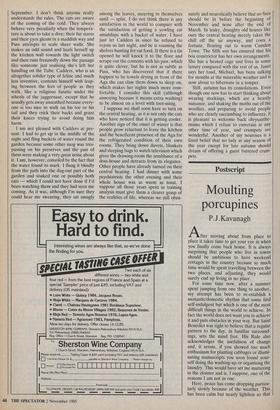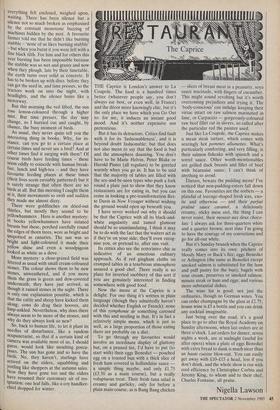Postscript
Moulting porcupines
P.J.Kavanagh
After moving about from place to place it takes time to get your eye in when you finally come back home. It is always surprising that people who live in towns should be ambitious to have weekend cottages in the country because so much time would be spent travelling between the two places, and adjusting, they would surely end up living in no place.
For some time now, after a summer spent jumping from one thing to another, my attempt has been to re-establish a monastic/domestic rhythm that some find self-indulgent but which is one of the most difficult things in the world to achieve. In fact the world does not want you to achieve it and puts obstacles in your way. But Saint Benedict was right to believe that a regular pattern to the day, in familiar surround- ings, sets the mind free. His Rule also acknowledges the usefulness of change and, it seems, if you showed too much enthusiasm for planting cabbages or illumi- nating manuscripts you soon found your- self doing the washing-up or organising the laundry. This would have set me muttering in the cloister and is, I suppose, one of the reasons I am not in one.
Here, peace has come dropping particu- larly slowly because of the weather. This has been calm but nearly lightless so that everything felt enclosed, weighed upon, waiting. There has been silence but a silence not so much broken as emphasised by the constant monotone buzzing of machines hidden by the mist. A favourite farmer told me that he didn't like burning stubble - 'none of us likes burning stubble' - but when you burnt it you were left with a fine black tilth. For him and for others this year burning has been impossible because the stubble was so wet and grassy and now when they plough, late by their timetable, the earth turns over solid as concrete. It has to be broken up with discs before they can get the seed in, and time presses, so the tractors work on into the night, with headlights, and the silence hums like a motorway. But this morning the veil lifted, the sun rose lemon-coloured through a higher mist. But time presses, the day may change, so I hurried out and caught, by chance, the busy moment of birds.
As usual, they never quite tell you the interesting thing in books. Why, for in- stance, can you go to a certain place at certain times and never see a bird? And at other times find it surging with them? Of course birds have feeding times - these seem oddly to coincide with human break- fast, lunch and high-tea - and they have favourite feeding places at these times (their lives seem enviably patterned) but it is surely strange that often there are no birds at all. But this morning I caught them at it, their movements so swift and sudden they made me almost dizzy. There were goldfinches on dried-out thistles, but mostly they seemd to be yellowhammers . Here is another mystery: in books yellowhammers have striated breasts but these, perched carefully round the edges of thorn trees, were as bright and unspotted as canaries. The sun was so bright and light-coloured it made their yellow shine and even a woodpigeon looked as white as a dove.
More mystery: a close-grazed field was littered as usual with small cream-coloured stones. The colour shows them to be new stones, unweathered, and if you move them the grass is green and dew-covered underneath; they have just arrived, as though it rained stones in the night. There is only one explanation possible, which is that the cattle and sheep have kicked them along; cows do drag their hooves, are limp-ankled. Nevertheless, why does there always seem to be more of the stones, and why do they always look so new? So, back to human life, to let it plant its needles of disturbance, like a random acupuncturist, so that if a certain kind of camera was available most of us, I should guess, would look like moulting porcu- pines. The sun has gone and so have the birds. No, they haven't, starlings have arrived on the elders, squabbling and Jostling like shoppers at the autumn sales. Now they have gone too and the elders have resumed their customary air of res- ignation: one leaf falls, like a coy handker- chief dropped for winter.























































 Previous page
Previous page